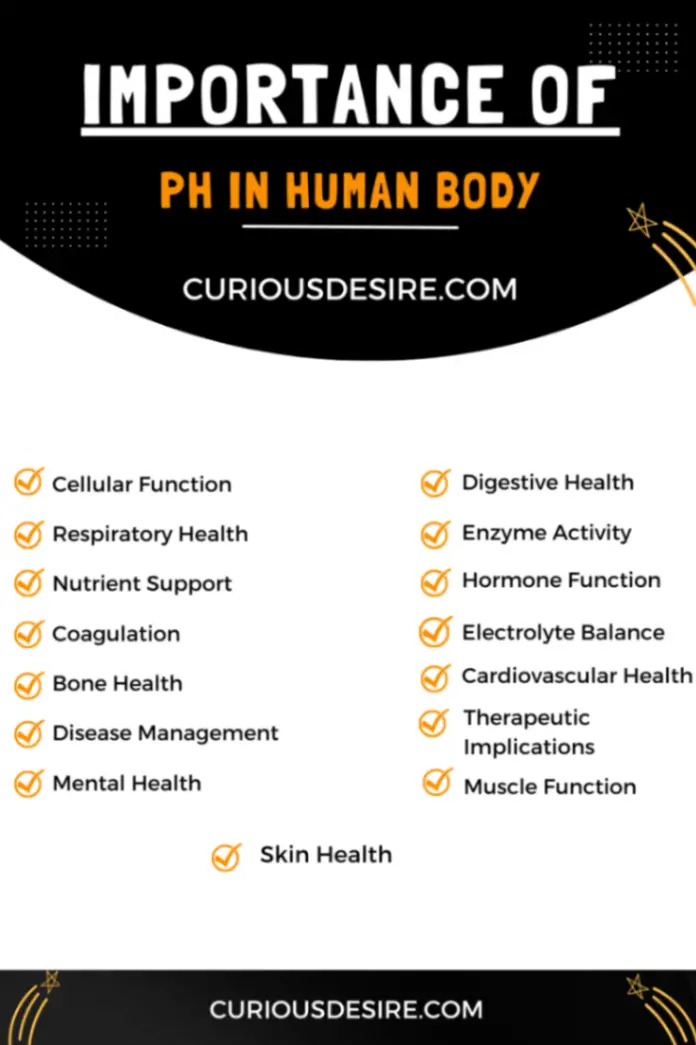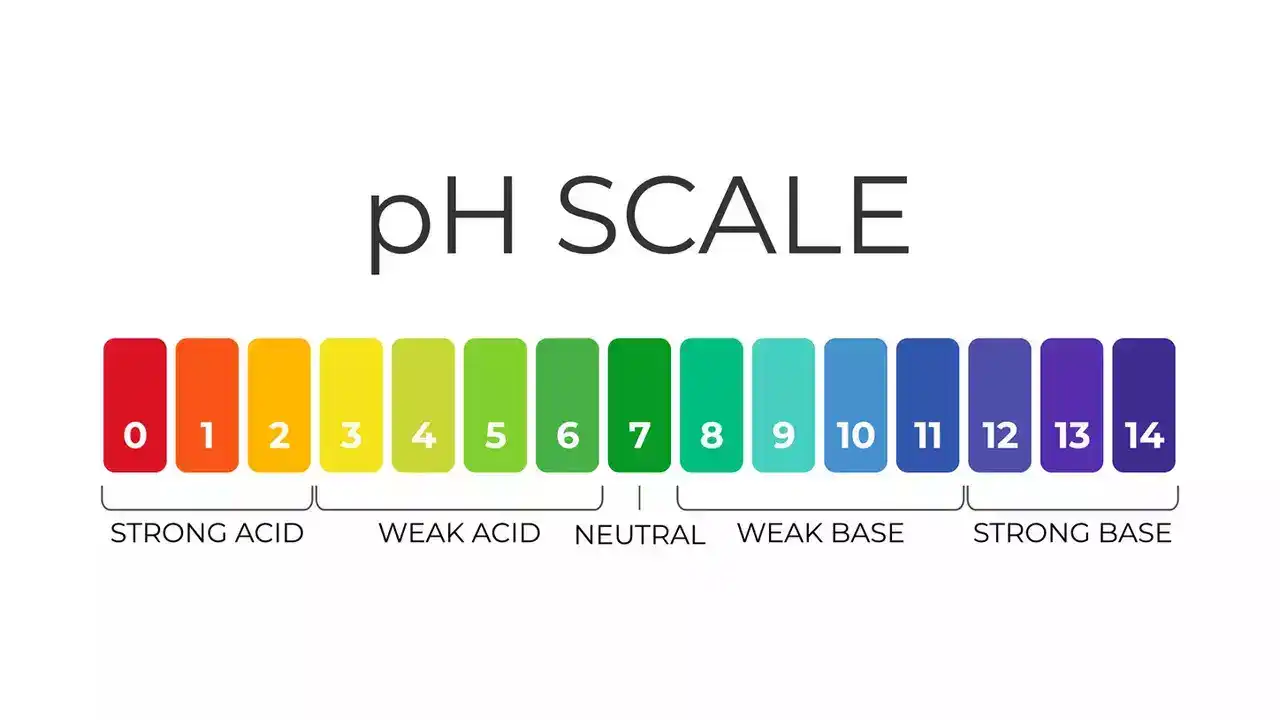The human body is a complex and intricate system that requires a delicate balance to function optimally. One crucial aspect of maintaining this balance is the body’s pH level.
The pH scale ranges from 0 to 14, with 7 being neutral, lower values indicating acidity, and higher values indicating alkalinity.
In the human body, pH balance is vital for a wide range of physiological processes, and maintaining the appropriate pH level is critical for overall health and well-being
This blog explores the critical role pH levels play in our bodies and offers insights into how we can manage this delicate balance for optimal health.
5 most common reasons for the importance of PH in human blood
- Enzyme Activity
- Nutrient Support
- Bone Health
- Heart Health
- Cellular Function

1. Cellular Function
The body tightly regulates blood pH within a narrow range of 7.35 to 7.45 to ensure the proper functioning of vital physiological processes.
Maintaining the appropriate pH is critical for cellular metabolism, energy production, enzyme activity, protein structure, and membrane function.
pH imbalances can affect cellular health and lead to premature aging or cell death.
2. Digestive Health
pH balance in the digestive system is essential for optimal digestion and nutrient absorption.
The pH of the stomach is a key factor in the digestion of food and serves as a barrier against ingested pathogens. Gastric acid, with a pH ranging from 1.5 to 3.5, aids in the breakdown of ingested food and serves as a first line of defense against potentially harmful microorganisms.
The pH levels within the digestive tract influence the gut microbiome. An imbalance can disrupt the microbial balance, leading to digestive issues and impacting overall health.
3. Respiratory Health
The respiratory system works in union with the kidneys to regulate acid-base balance in the body.
Carbon dioxide (CO2) levels in the blood influence pH through the formation of carbonic acid, which can alter blood pH. The body’s ability to regulate respiratory rate and eliminate CO2 is essential for maintaining acid-base equilibrium.

4. Enzyme Activity
Enzymes, which are essential for catalyzing biochemical reactions in the body, are highly sensitive to changes in pH. Most enzymes function optimally within a specific pH range, and deviations from this range can significantly affect enzymatic activity.
Maintaining the appropriate pH environment is crucial for ensuring proper enzyme function and, subsequently, normal physiological processes.
Research published in the Journal of Biological Chemistry highlighted the intricate relationship between pH and enzyme function, emphasizing the vital role of optimal pH conditions in facilitating enzymatic reactions.
5. Nutrient Transport
The pH of bodily fluids, such as blood and interstitial fluid, influences the transport of nutrients across cell membranes.
Changes in pH can affect the ionization of nutrients and alter their solubility and transport mechanisms.
The pH of the stomach and intestines also influences the absorption of nutrients. For instance, an overly acidic or alkaline stomach pH can impair the body’s ability to absorb essential nutrients like vitamins and minerals.
6. Hormone Function
pH levels in the body play a critical role in modulating hormone activity and secretion.
Hormones, such as insulin and glucagon, are sensitive to changes in pH, and alterations in pH can impact their stability and function.
Proper pH regulation is essential for the normal secretion and action of hormones involved in various physiological processes.
According to research, 6-phosphofructo-1-kinase, a rate-limiting enzyme in glycolysis, gets activated directly by a rise in pH.
7. Coagulation
Blood pH is a critical factor in the complex process of coagulation.
Changes in pH can affect the activity of clotting factors and platelets, influencing the blood’s ability to clot effectively. Proper pH balance is essential for maintaining normal coagulation and preventing excessive bleeding or abnormal clot formation.
Platelets play a crucial role in the initial stages of coagulation by adhering to the site of injury and forming a plug. Their ability to aggregate and form clots is pH-dependent.
8. Electrolyte Balance
pH levels in the body are closely linked to the regulation of electrolytes, such as sodium, potassium, and calcium. Changes in pH can impact the distribution and movement of electrolytes within cells and the extracellular environment.
Electrolyte balance is crucial for nerve signaling, muscle function, and hydration. Imbalances can lead to conditions like arrhythmia or muscle weakness.
9. Bone Health
Acid-base balance and pH regulation play a vital role in bone health
Acid-base disturbances can influence bone mineral density and the body’s acid-base buffering systems.
Chronic deviations in pH can potentially affect bone metabolism and contribute to conditions such as osteoporosis.
10. Cardiovascular Health
The pH of blood and other bodily fluids is integral to cardiovascular function.
The heart’s electrical activity, which controls the heartbeat, is influenced by pH levels. Imbalances can affect heart function and increase the risk of cardiovascular diseases.
Proper pH levels are essential for normal cardiac electrical activity, vascular tone, and the regulation of blood pressure.
11. Disease Management
pH monitoring and regulation are essential in the management of various health conditions.
Research suggests that acid-base imbalances can occur in conditions such as diabetic ketoacidosis, renal failure, and respiratory disorders.
Understanding and addressing pH disturbances are fundamental aspects of managing such diseases and optimizing patient outcomes.
12. Therapeutic Implications
The importance of pH in the human body has far-reaching therapeutic implications.
Pharmaceutical formulations, medical treatments, and interventions aimed at restoring pH balance and addressing acid-base disorders are integral to managing numerous health conditions and optimizing patient care.
Therapeutic strategies are designed to correct pH disturbances and mitigate their impact on overall health.
13. Mental Health
There is emerging evidence that pH imbalances may affect mental health. For example, acidosis has been linked to an increased risk of depression and anxiety.
The brain’s neurotransmitters, chemicals responsible for transmitting messages between neurons, are sensitive to changes in pH levels. An optimal pH level is crucial for the proper functioning of these neurotransmitters.
14. Muscle Function
The impact of pH balance on muscle function is significant and multifaceted, influencing everything from muscle contraction to endurance and recovery
Muscle contraction relies on various enzymes and proteins that are sensitive to pH levels.
A slight deviation from the optimal pH can impair the interaction between actin and myosin, the proteins responsible for muscle contraction, thus affecting muscle performance.
15. Skin Health
The pH balance plays a pivotal role in maintaining skin health and integrity.
The skin’s surface, known as the acid mantle, is naturally acidic, with a pH ranging from about 4.5 to 5.5.
The acidic pH of the skin acts as a barrier against harmful microorganisms. Many bacteria and viruses that come into contact with the skin are neutralized or their growth is inhibited in this acidic environment.
An optimal pH helps maintain the skin’s barrier function by promoting the formation of a healthy lipid layer on the skin’s surface.
Maintaining pH Balance
Maintaining a proper pH balance is essential for overall health and well-being. While the body has natural buffering systems to regulate pH, several factors can influence pH levels and potentially disrupt the delicate balance.
Here are some key considerations for maintaining a healthy pH balance:

1. Diet
One of the most significant factors influencing pH balance is diet. The foods we eat can either contribute to an acidic or alkaline environment in the body.
While some foods, such as fruits and vegetables, contribute to an alkaline environment, others, such as processed foods, red meat, and sugary beverages, can contribute to acidity.
A diet rich in fruits, vegetables, and whole grains, with moderate amounts of lean proteins, can help support a healthy pH balance.
2. Hydration
Proper hydration is essential for maintaining optimal pH balance.
Drinking an adequate amount of water helps to support the body’s natural buffering systems and flush out acidic waste products.
Alkaline water, which has a higher pH level than regular water, has gained popularity for its potential to help support pH balance.
3. Stress Management
Chronic stress can contribute to an acidic environment in the body.
Stress triggers the release of cortisol, a hormone that can influence pH levels. Engaging in stress-reducing activities such as meditation, yoga, or deep breathing exercises can help support a more alkaline environment in the body.
4. Exercise
Regular physical activity can support a healthy pH balance by promoting oxygenation, circulation, and the elimination of acidic waste products through respiration and sweat.
However, intense and prolonged exercise can lead to the accumulation of lactic acid, contributing to temporary acidity in the muscles.
5. Health Conditions
Certain health conditions, such as kidney disease, respiratory disorders, and diabetes, can impact the body’s pH balance.
People with these conditions need to work closely with healthcare providers to manage their pH levels and overall health.
Source: Medical Centric YT Channel
Conclusion
Maintaining a proper pH balance is essential for the optimal functioning of the human body.
The body’s natural buffering systems work to regulate pH levels, and several factors, including diet, hydration, stress, and exercise, influence the body’s pH balance.
By being mindful of nutrition, hydration, and lifestyle factors, you can support the body’s natural ability to maintain a healthy pH environment.
As with any aspect of health, it’s essential to approach pH balance holistically and consider the broader context of overall well-being. It’s always advisable to consult with a healthcare professional for personalized guidance on maintaining optimal pH balance and overall health.
Importance of PH in Human Body FAQs
1. What is the importance of pH in medicine?
pH value is a critical factor in the wound healing process and could offer important physiological condition information regarding skin status and infection. It assists physicians with clinically relevant diagnosis and patient wound care
2. What causes high pH in the body?
A kidney problem can lead to a high blood pH. This may happen if the kidneys don’t remove enough alkaline substances through the urine. For example, bicarbonate may be incorrectly put back into the blood.
3. What is the full form of pH?
The negative logarithm of the concentration of H+ ions is known as pH. As a result, the meaning of pH is defined as the strength or power of hydrogen.
4. What are the signs of bad pH?
When your body becomes too acidic (as in acidosis) or too alkaline (as in alkalosis), it can lead to symptoms that make it difficult to manage everyday activities. The exact symptoms will depend on the type of pH imbalance but can include sleepiness, fatigue, headache, loss of appetite, confusion, and vomiting
5. Is a high pH harmful?
When measured on the pH scale, anything above a 7 on the scale is considered a base. When the pH levels reach or exceed 12.5 pH, it then becomes hazardous. As with all hazardous wastes, when in contact with human or environmental health, it can be very dangerous.